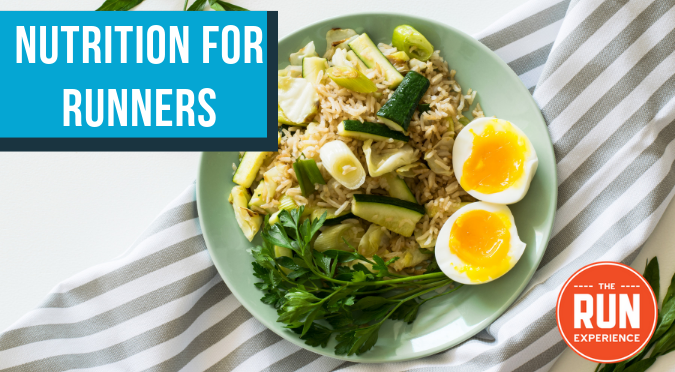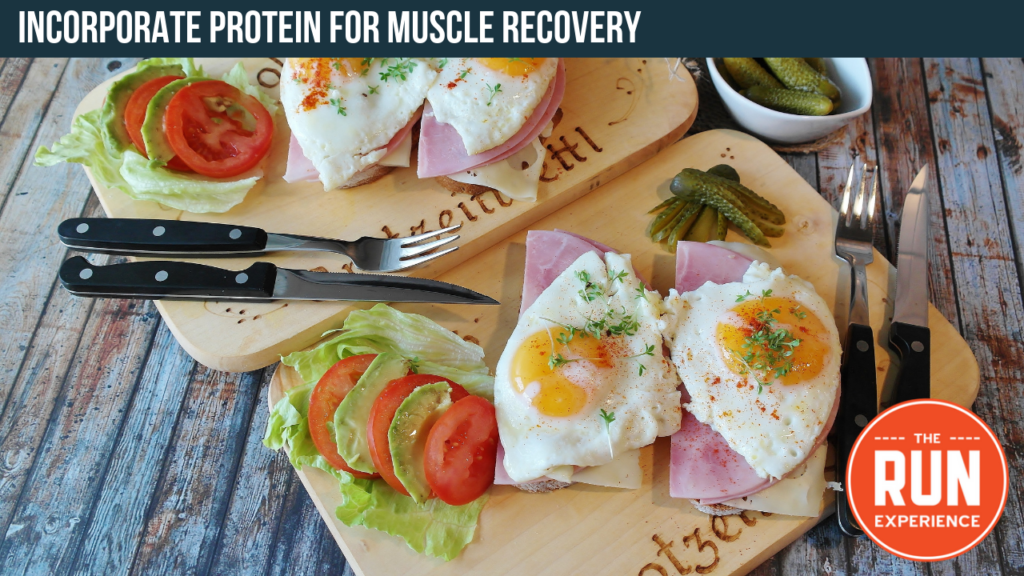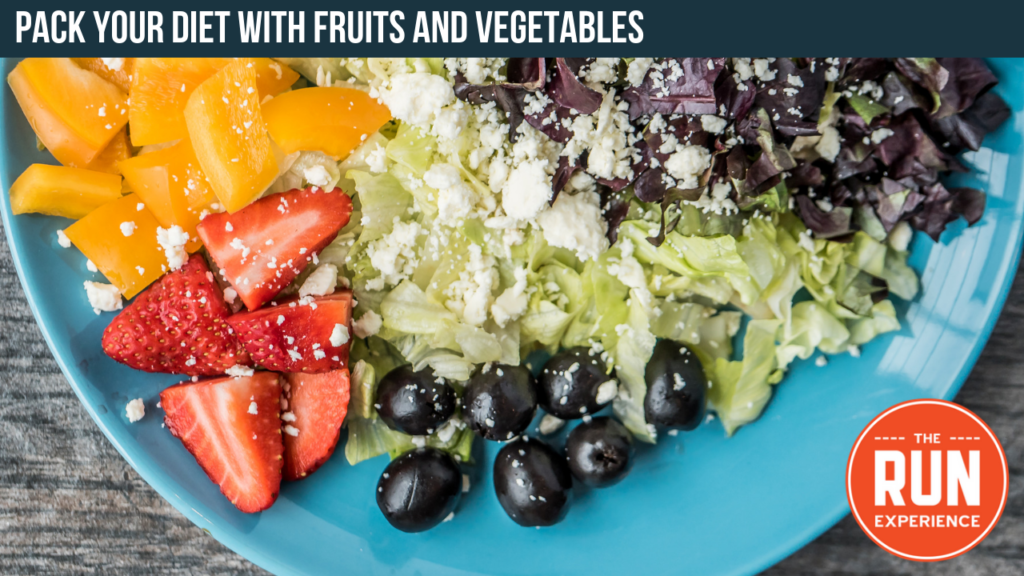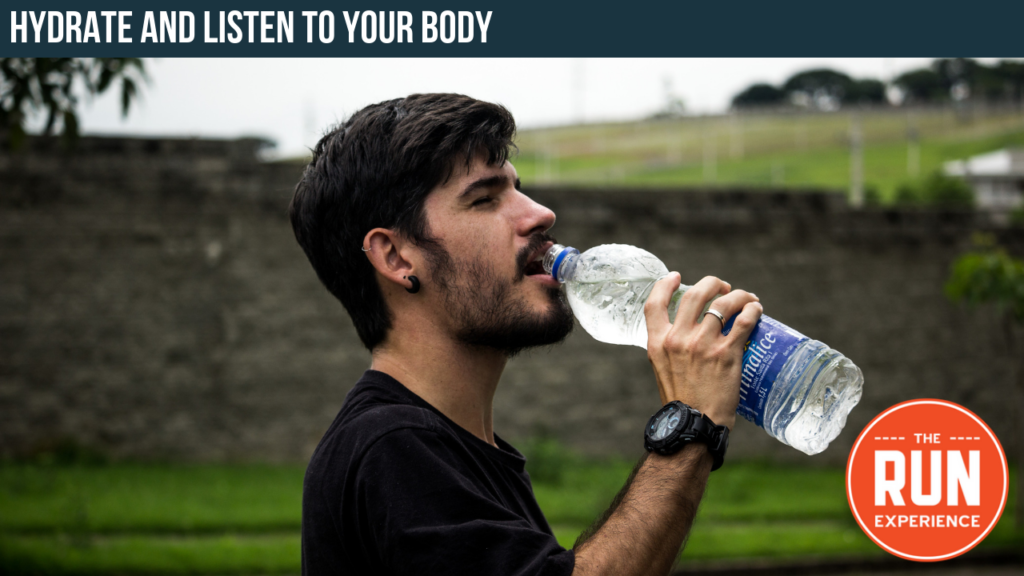Nutrition for Runners: Optimize Your Running with These Top Tips

If you’ve been a runner for very long at all, you are acutely aware of how what you eat impacts your running performance. Food is meant to be enjoyed as well as fuel everything we do during the day from our cognitive processes to our race day performance. In this article, we will explore nutrition for runners with the best tips to optimize your running every day.
Determine How Many Calories You Need
Depending on how much you run, your gender, and your current size, you’ll need different amounts of calories to appropriately fuel your body. For example, if you’re training for a marathon and logging major miles, you’ll need more. You can use this calculator to estimate how many calories you’re burning and decide how many calories to budget for.
If you’re trying to lose weight, it’s very common for new runners to experience an increase in appetite because your body naturally your wants to maintain its current weight–so you’ll likely feel more hungry. Stay aware of how many calories you’re eating and remember–weight loss is about calories in vs. calories out.
Don’t Be Afraid of Carbs
While high-fat, low carb diets are all the rage right now, carbohydrates are definitely valuable for runners. Complex carbohydrates are great for fueling runs and giving us steady energy. Your diet should contain about 65 percent healthy whole grains. Steer clear of processed foods and sugary carbs that can cause blood sugar spikes that have you hitting the wall before you reach the finish line.
Embrace Healthy Fats
Before high-fat, low-carb diets became popular, low-fat diets were common, especially among endurance athletes. However, we want a balanced mix! Body fat is a key source of energy for runners and helps your body absorb vitamins.
Furthermore, when you’re running long distances, body fat is a backup source once you’ve burned up all your carbs–so it really helps you keep pushing during the later miles. Incorporate healthy fats found in chicken, coconut oil, avocado, fish, seed and nuts into your recovery meals. They aren’t digested quickly, so avoid eating much fatty food right before a run.
Use Protein to Strengthen and Recover Your Muscles

While carbs and fats serve as fuel for runners, protein helps build strong muscles and aids in recovery after training runs and races. When you run, your body breaks down your muscles and protein helps build it back up.
Women should eat about three ounces of protein per meal and men should have four to five ounces. Try to incorporate protein into your post-run meals and snacks about 20 minutes after finishing to maximize its effect on muscle recovery. Good sources of protein include eggs, dairy, meat, fish, and protein powder. A protein shake is a great post-run recovery drink!
Fortify Your Diet with Fruits and Vegetables

Fruits and vegetables are packed with vitamins and minerals, have powerful antioxidants, and provide anti-inflammatory properties, which helps reduce muscle soreness and prevent injuries.
Incorporate fruits and vegetables into any meal or snack, but if you have stomach issues while running, try not to eat them right before a run–especially raw fruits and vegetables. Good sources that are high in anti-inflammatory benefits include berries, peaches, plums, cherries, sweet potatoes, kale, and red bell peppers.
What do Eat During Your Run
If you’re going on a run that’s an hour or less, you shouldn’t need anything more than water. If you’re going on a longer training run or running a half marathon or marathon, you’ll want to plan ahead. Energy gels and sports drinks are great simple carbs that your body can digest quickly and use instantly.
If you want “real food”, a banana is great choice. It’s easy to digest and provides potassium that can help keep your muscles from cramping.
Hydrate, Hydrate, Hydrate

A lot of runners worry they aren’t getting enough water, especially when you’re running in the heat. However, following a few simple guidelines and listening to your body can ensure you are drinking an appropriate amount of water.
Some people don’t mind carrying a water bottle during runs when it’s hot out. I’m not one of them. On shorter runs, you can drink some water beforehand and hydrate after. For longer runs, you can carry a bottle or simply choose a route with water fountains for a few sips. However, you don’t want to guzzle a big bottle in the middle of a run–you’ll only be inviting stomach cramps later on.
It’s also helpful to weigh yourself before and after your run. If you’re three pounds lighter after a long, sweaty run, keep drinking water until you’ve replaced it are weighing in at the same number as you started. In most cases, water alone is fine for rehydrating your body. Sports drinks should only be used in long endurance events–they contain sugars and calories you don’t need for hydration.
Finally, check the color of your urine. If it’s pale yellow or clear, you’re good to go!
Pro-tip: Caffeinated beverages like coffee and soda and alcohol are diuretics, causing you to shed water quickly. For each caffeinated beverage or alcoholic drink you have, replace it with a glass of water.
Now, let’s check out some nutrition for runners tips from sports nutrition expert, Coach Elizabeth!
- Focus on foods typically found in the center of the grocery store, such as green, leafy vegetables and bright-colored veggies such as peppers, as well as zucchini, mushrooms, and cucumbers.
- Fill up your cart with healthy carbohydrates such as sweet potatoes and squash.
- Include fruit such as kiwi, berries, bananas, and apples.
- If you eat meat, go for a limited amount of red meat, lean chicken, turkey, and pork. Remember, we are aiming for about three ounces per meal for women and four to five ounces for men.
- Incorporate fish such as salmon, cod, halibut, and tuna into your diet to reap the benefits of omega-3 fatty acids.
- Include healthy fats that keep your immune system strong and speed recovery, such as avocado, nuts, seeds, and cold-pressed oils.
- The most important factor is consistency. You can’t practice a healthy diet for one week and eat horribly the next week to get the results you want.
- Find founds you like in the right quantities to help keep you consistent. Make a meal plan to help you stick to a healthy diet.
- Mix it up! Eating healthy doesn’t have to be bland or boring. Experiment with different flavors and recipes to keep things interesting so you don’t fall into a rut and have cravings for unhealthy foods.
Don’t forget to check out our full list of nutrition videos on our YouTube page!
Now that you know how to fuel your body for great training workouts and races, it’s time to download our new mobile app for access to coaching advice, daily video workouts, injury prevention tips, and complete training programs.
You can even keep track of your runs with our GPS Run and receive community support. Think of it as your own personal running coach, right in your pocket. It’s available for download now on the iOS App Store.
